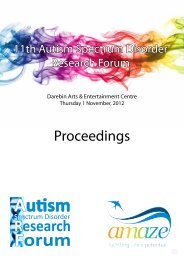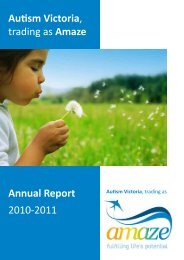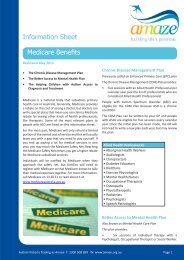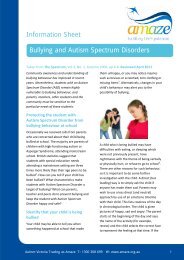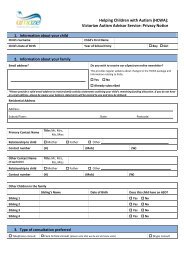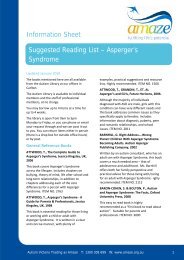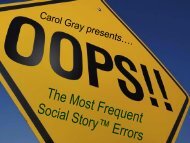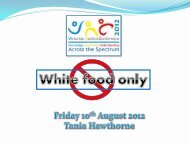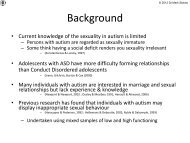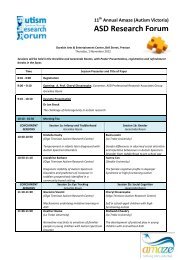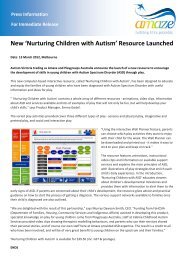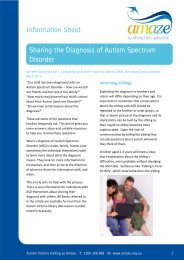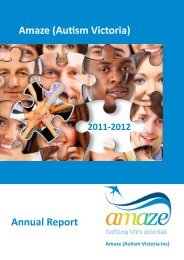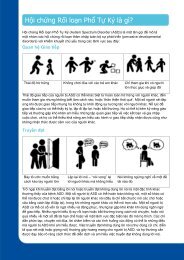Susan Wade - Amaze
Susan Wade - Amaze
Susan Wade - Amaze
You also want an ePaper? Increase the reach of your titles
YUMPU automatically turns print PDFs into web optimized ePapers that Google loves.
<strong>Susan</strong> <strong>Wade</strong>ParentStream: Primary YearsSharing the diagnosisSharing a diagnosis with a child is an important task (Attwood, 2006) with potential to positively influenceself-understanding, self-management and self-advocacy (Whitaker, 2006). Families can help to shape apositive understanding of the autism spectrum tailored to the individual child.This presentation aims to provide a case-study of how one family shared the diagnosis of Asperger’sSyndrome (AS) with their eight year old son, offering specific strategies as well as considering theirrationale and effectiveness. The approach used was a combination of available resources (e.g. Attwood,2006; Hoopman, 2006; Kerr, 2005) which followed an introductory card game called ‘See Me’, designed toappeal to the child’s motivation and strengths (visual & pattern recognition). The game involved the childselecting a statement he thought best described himself from a pair of opposing statements on either sideof a card. Statements were based largely on the Autism Quotient (AQ-Child) (Auyeung, Baron-Cohen,Wheelwright & Allison, 2008). AS characteristics were on a different coloured background so that a‘pattern’ became evident. An explanation of the diagnosis based on the ‘Attributes Activity’ (Attwood,2006) was used. This approach encouraged autonomy by allowing the child to essentially ‘paint thepicture’ of themselves, providing a visual pattern as a basis for illustrating an abstract concept. The child’sreaction was one of interest, acceptance and pride.This presentation will assist families and professionals by offering a case-study which will inform otherspreparing to help a primary school aged child to understand the Autism Spectrum. Topics covered include:• Building understanding of the Autism Spectrum • Timing • Concepts introduced before sharing thediagnosis • Planning for a positive first ‘talk’ • Building on the initial conversation • Communicating withothers about the approach used • Pros and cons of sharing the diagnosis.About <strong>Susan</strong><strong>Susan</strong> is a PhD candidate in the Faculty of Education at Monash University. She is also an experiencedsecondary teacher and mother of a son with Asperger’s Syndrome. <strong>Susan</strong> holds a Bachelor of Arts (Hons)from The University of Melbourne, A Graduate Diploma of Education (Secondary), and a Masters degree inEducation from Monash University. She has given seminars, conference presentations and staffprofessional development sessions relating to education and parenting of individuals on the AutismSpectrum. <strong>Susan</strong> has been awarded the Monash University / Herald Sun Victorian Graduate Teacher of theYear and an Australian Postgraduate Award (APA).
Amanda Busutil, Leanne Deniese &Diana DarmaninConnectEdStream: Primary YearsBridging the Gap between Allied Health and the Mainstream ClassroomWith a disorder as puzzling and unique as ASD it is not surprising that a myriad of health professionals areinvolved to provide recommendations to assist these children achieve their maximum potential. Thispresentation will focus on transforming these recommendations and considerations, suggested by variousAllied Health Professionals, into practical strategies that are needed to support the learning and wellbeingof students with ASD in the classroom.The presenters will work through a step-by-step process, combining our specialist background knowledge,to provide practical information on easy-to-implement strategies and tools that will assist schools to beable to: • Understand the common recommendations made by Allied Health Professionals for childrendiagnosed with ASD who are integrated into the classroom • Categorise the recommendations into variousareas of development and identify any overlapping recommendations across the different disciplines •Determine the contributions that parents, teachers, aides and Allied Health members make inimplementing these recommendations • Make the link between report recommendations and practicalstrategies that can easily be incorporated into the classroom for children with or without 1:1 support. Thepresentation will be based on a case-study which will demonstrate effective implementation of the abovementionedprocess in a mainstream setting.Included in this presentation will be: • Baseline data, in the form of a checklist that collates and outlinesinformation regarding the needs of the child prior to the practical strategies being implemented • Ideas foreasy-to-use tools that have been successfully utilised in a mainstream setting by teachers and support staffwhich include sequence charts, visual cue packs, checklists for the classroom and more • Video evidence ofstrategies and tools being used in the mainstream classroom; professional learning provided to teachers aswell as support staff; and interviews with parents and teachers.About AmandaAt ConnectEd. we strive to build the capacity of educators, health professionals and carers in thecommunity. We aim to create strong connections between individuals, families, professional informationand education. The team members at ConnectEd. have worked extensively in educational settings, for acombined period of over 30 years. The team is comprised of a qualified teacher (Curriculum andAssessment Consultant), speech pathologist and behavioural therapist/integration co-ordinator who bringtogether their multidisciplinary skills and knowledge to provide practical information, strategies, programsand resources for inclusive learning in all environments.
Daniel DonohooDirectorProject SynthesisStream: Primary YearsMore than just an iPad: Unpacking Tech and AutismThis presentation will provide an engaging and practical workshop that teaches the audience how to think abouttechnology in relation to children and young people with autism. Families will be able to consider the positiveand negative impacts an iPad or similar device can have on your child's learning and development. Thepresenter opens a world of apps and app-cessories, looks at where parents can help the real and virtual worldscollide and asks where are therapists and support services getting their information and training from in the useof these devices. What do parents need to consider in terms of their technology set-up at home to make themost of the iPad? What apps are best and who makes the decision that an app is right for your child? Delegateswill learn how we might use iPads and other mobile technologies, and how quickly we might be looking to moveto new technologies in the future. The presentation will also address the value of using technology to supportdevelopmental goals, deals with how to choose good apps, how to talk with your support networks about theiPad and other technology, the risks and issues associated with different devices, when and why you might needan iPad.About DanielDaniel Donahoo is the Director of Project Synthesis. He is a researcher and author whose books include "IdolisingChildren" (2007) and "Adproofing Your Kids" (2009). He writes about education and technology for Wired.comand Huffington Post where he reviews apps and advocates for the intelligent use of mobile devices to supportchild development. He has worked over the last 18 months in iPad trials with early childhood interventionservices and advising DEECD on technology in education.www.projectsynthesis.com.auwww.danieldonahoo.comtwitter: @ddonahoo
Lia CastorinaManager, Autism Advisor ServiceAutism Victoria trading as <strong>Amaze</strong>Stacey AroutzidisFamily CounsellorAutism Victoria trading as <strong>Amaze</strong>Stream: Primary YearsSupporting siblings of children with ASDSibling relationships often last longer than any other relationship in the family. They can provide a child'sfirst opportunity for socialisation and are often instrumental in helping children develop social skills, self -esteem, and their own sense of identity.Siblings of children with special needs often take on the role of "protector" of their brother or sister, andwith this additional responsibility comes a range of emotions, including feelings of guilt, grief, jealousy, andresentment. There are also often positive outcomes for siblings, many of whom develop a higher level ofrespect for people who are different, and often show high degrees of resilience and empathy.Parents often wonder how much information to give siblings about their brother or sister's condition, andhow to best support and encourage their child in this very important role. This session will provide abackground into some of the challenges and positive outcomes for siblings of children with ASD, and willlook at ways to help your child understand ASD, and what it means for their sibling and the rest of thefamily. It aims to provide some insight into understanding the needs of siblings and suggestions for ways toencourage positive sibling relationships. Tips for strengthening the parent-child relationship (such asspending quality time with siblings and assisting your child to maintain a balance between the child andhelper role) will also be covered. Finally, sibling resources and practical strategies to assist families andprofessionals will be offered.About LiaLia is an Educational and Developmental Psychologist whose research interests include ASD and social skillsdevelopment. As part of her Master's degree, Lia designed, ran, and evaluated a social skills trainingprogram for children with ASD and their siblings through RMIT University. In addition to a brief stint with theNational Autistic Society in London, Lia worked as an educational psychologist in the Victorian governmentschool system before joining Autism Victoria, trading as <strong>Amaze</strong>. Lia manages the Victorian Autism Advisorprogram that administers the Australian government’s Helping Children with Autism funding for childrenaged 0-6. She has published in the area of social skills training for boys with Asperger Syndrome, and iscurrently collaborating on a chapter on family adaptation for a handbook on early intervention in AutismSpectrum Disorders. Lia serves on the Advisory Committee for the Olga Tennison Autism Research Centre.About StaceyStacey is a Family Counsellor at Autism Victoria, trading as <strong>Amaze</strong> with extensive experience in the field ofASDs both in family and professional settings. Stacey has been involved in early intervention, social groups,family support, educational seminars, crisis counselling and more recently has developed key resources foran early childhood and primary based mental health initiative. In her role as a Family Counsellor sheprovides support, advice, and education to families and professionals. Stacey has a Master in DisabilityStudies and is currently studying towards a Master of Educational Psychology. Stacey has a strong interest inchild and adolescent psychology, with a special interest in sibling relationships. Stacey is especiallypassionate about promoting further understanding of Autism Spectrum Disorders.
Julie LandyPaediatric Service Unit LeaderSunbury Community Health CentreStream: Primary YearsSwimming Lessons for Children with AutismSwimming and water activities are a fundamental part of the Australian lifestyle, with attendance at swimminglessons being ‘the norm’ for many children. In addition to the physical, therapeutic and safety benefits oflearning to swim, swimming lessons also provide children with social connectedness, an introduction tocommunity facilities and unique sensory experiences. Families of children with an Autism Spectrum Disorder(ASD) face numerous barriers when attempting to access community swimming lessons. Parents report thatthese barriers include swimming instructors’ false stereotypical beliefs regarding ASD, inappropriate teachingstrategies, lack of communication aids and the financial burden of private or individual swimming lessons.The KickStart Swimming Program was developed to address these barriers and make small group swimminglessons accessible and effective for children with Autism. The KickStart Program was developed in 2007, by amultidisciplinary team at Sunbury Community Health Centre, in consultation with families and swimminginstructors. Key features of this program include swimming instructor training; use of visual communicationaids in the pool environment, regular communication between parents and swimming instructors, andenvironmental modifications to maximise the student’s potential to learn.Resources designed to enhance this program include a poolside visual schedule, swimming social stories, skillsheets for swimming instructors and parent tip sheets. This presentation will provide an overview of theKickStart Swimming Program, demonstrate communication aids and resources available for use in the poolenvironment, and discuss evidence based swimming lesson modifications that create positive experiences forchildren with ASD. Parents will be provided with information and resources to empower them to work inpartnership with their local swimming centre, to create a positive social and learning environment for theirchild.About JulieJulie is a speech pathologist with over 15 years of experience working with children and their families in thefields of early intervention, community health and private practice. She is currently in the role of PaediatricService Unit Leader at Sunbury Community Health Centre. Since 2007, Julie has been the coordinator the of theKickStart Program - a health promotion initiative of Sunbury Community Health Centre. Through this program,Julie now works with a team of allied health professionals, swimming instructors and community agencies todeliver community based services for children with autism.
Sue LarkeyEducational SpecialistEducation EventsStream: Primary YearsPromoting Understanding - Creating an inclusive environment for allAbstract coming soon.About SueSue Larkey is uniquely positioned within the Education System having both taught as a Primary SchoolTeacher and Special Education Teacher. Sue has taught students with Autism Spectrum Disorder inmainstream and specialist schools. She combines the practical experience with extensive research, havingcompleted a Masters in Special Education and currently undertaking a Doctorate of Education.
Louise FordClinical PsychologistMinds and Hearts Clinic, QueenslandStream: Primary YearsManaging Anxiety in the primary school aged child with Asperger's SyndromeChildren with Autism Spectrum Disorder (ASD) are more susceptible to experiencing high levels of anxietythan non-ASD children. Difficulties with being able to recognise, communicate and manage their anxietyeffectively are common and high levels of avoidance, school refusal, difficult behaviour and socialwithdrawal often result. Parents are often at a loss as to how best manage these challenges in theirchildren which can significantly affect other members of the family.In this presentation ways to assist primary school-aged children to better understand and manage theiranxiety will be discussed. The important treatment components of a cognitive behaviour therapy programfor treating anxiety in children with an ASD will be presented. Time will be spent focusing on supportingparents to assist their children with their anxiety. The presenter will also focus on the importance ofparental self-care and available respite options.Specifically the presentation will include information on: • Basic emotional education focusing on anexploration of happiness and relaxation • Recognising the different levels of intensity of anxious feelingsand the associated bodily sensations • Strategies to reduce anxiety • The important role a child’sthoughts play in how the child is feeling • Ways that parents can assist their child to better manage theirfeelings • How parents can ensure that they are also taking steps to look after themselves in amongst thechallenges of raising a child on the spectrum.Key resources and practical tips that may assist parents and professionals working in the area will beincluded.About LouiseLouise is a clinical psychologist who completed her Doctorate in Clinical Psychology at Griffith University.She conducted her Doctoral research into the treatment of childhood anxiety disorders, which remains ofongoing clinical interest to her. Louise has co-written a number of group programs tailored towardsindividuals with an Asperger’s Syndrome diagnosis including an emotion management program for veryyoung children, self-identity groups for younger and older females, and programs for individuals with asibling on the spectrum. In her work at Minds and Hearts Louise regularly assists parents of children andadolescents on the autism spectrum to better manage their children’s often difficult behaviours, enhancetheir social skills and improve their emotional awareness and management. She has a number of yearsexperience in the area as a clinician/diagnostician and has provided very successful trainings andpresentations on ASD both locally and overseas.



